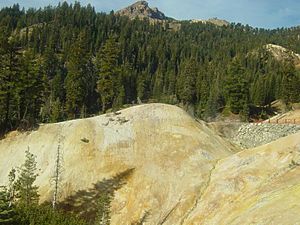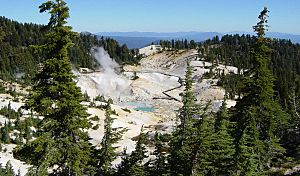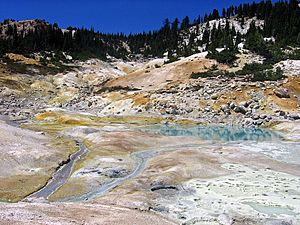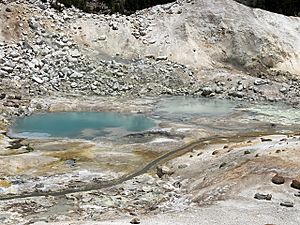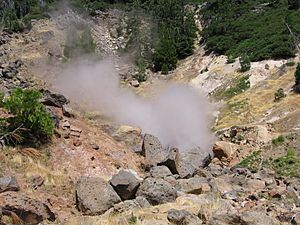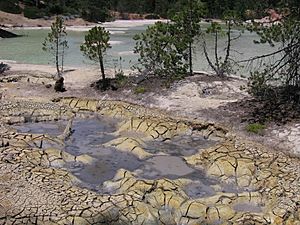Geothermal areas in Lassen Volcanic National Park facts for kids
The geothermal areas in Lassen Volcanic National Park are amazing spots where you can see the Earth's heat escaping! These areas have lots of hot springs and fumaroles (which are like steam vents). They are leftovers from old volcanic activity. Most of these hot spots are found near or inside the huge crater of Mount Tehama.
The most famous spot is Bumpass Hell, but there are other cool places too, like Sulphur Works, Little Hot Springs Valley, Boiling Springs Lake, and Devil's Kitchen. The water in these hot springs is usually super hot, close to boiling! For example, it can be around 198 °F (92 °C) at Bumpass Hell. Some spots in the park have even reached 230 °F (110 °C)!
How active these springs are depends on how much water is around. In early summer, when there's lots of water, the springs are clear. But as summer goes on and water decreases, they can change. They might become cloudy, then turn into bubbling mudpots, and finally just steaming fumaroles. It's important to know that Lassen Volcanic National Park does not have any true geysers (like Old Faithful).
The gases coming out of these hot springs are mostly steam and carbon dioxide. These gases react with the rocks nearby. This can create new minerals like opal (if it's very hot and acidic) or kaolin (if it's cooler). You might also see deposits of sulfur, pyrite, and quartz around the springs.
Long ago, a much larger area inside Mount Tehama's crater was changed by these hot gases and liquids. This changed rock was softer and wore away easily over time. That's why some parts, like Diamond Peak, still stand tall – they are made of harder rock that didn't change.
Contents
Sulphur Works and Little Hot Springs Valley
At Sulphur Works and Little Hot Springs Valley, the rocks have been changed by chemicals into bright, colorful clays. Strong acids, like those found in car batteries, have broken down the hard, gray-green lava rocks. They turn into red, yellow, and tan clays and iron oxides.
Many visitors drive through Sulphur Works on State Route 89. You'll often smell a "rotten-egg" scent (which is hydrogen sulfide gas) as you pass a hot vent east of the road. Sulphur Works is thought to be an old volcanic center of Mount Tehama.
Bumpass Hell: A Steaming Wonderland
Close to Little Hot Springs Valley is Bumpass Hell. This is a huge geothermal area, about 16 acres (6.5 hectares) wide. It's filled with hot springs, fumaroles, and boiling mudpots. It's part of Mount Tehama's main vent. The heat comes from cracks in the Earth that reach down to hot rock, maybe three miles (5 km) below the surface.
The area is named after Kendall Vanhook Bumpass. He was a cowboy and early settler who worked near Lassen Peak in the 1860s. Bumpass found this amazing hot spot and even claimed it for mining. In 1865, a newspaper editor went with Bumpass to see the area. During their trip, Bumpass accidentally stepped through a thin crust over a super hot mudpot. His leg was badly burned and later had to be removed. The area was named in his honor to remember his discovery and accident.
Devils Kitchen: Acidic Pits
About 7 mi (11 km) southeast of Lassen Peak, you'll find Devils Kitchen. In this geothermal area, the hot springs are so acidic that they have actually eaten away at the solid rock. This creates pits and holes in the ground.
Terminal Geyser: A Steamy Stream
Located in the park's southeast corner, Terminal Geyser isn't a true geyser. Instead, it's a cold stream flowing over a steam vent. This spot is about 100 feet (30 m) from where people drilled into the ground in 1962 and 1978 to study the heat. That 4,008-foot (1,222 m) deep well is now sealed up.
Boiling Springs Lake: A Hot, Acidic Lake
Just northwest of Terminal Geyser is the large, warm Boiling Springs Lake. Along its west shore, you'll see many hot springs, mudpots, and fumaroles. Unlike other busy areas of the park, this spot doesn't have boardwalks or signs. It offers a chance to see these hot features in a more natural setting.
In 2012, scientists studying viruses in Boiling Springs Lake made an exciting discovery. They found the first known natural "chimera" virus. This means it was a hybrid, or mix, of two different groups of viruses that had combined into one new organism. They called this "mythological beast of a virus" the "Boiling Springs Lake RNA−DNA Hybrid Virus" (BSL−RDHV). This discovery showed how much more there is to learn about how viruses can change and evolve. Other similar "chimeric viruses" have since been found elsewhere.
 | Dorothy Vaughan |
 | Charles Henry Turner |
 | Hildrus Poindexter |
 | Henry Cecil McBay |


